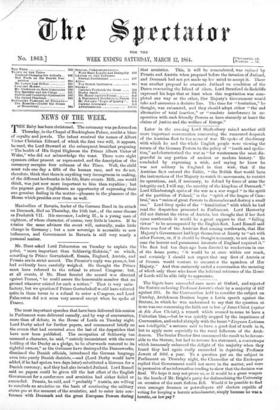Later in the evening Lord Shaftesbury raised another still more
important conversation concerning the rumoured despatch of the Austrian fleet to the scene of war. He spoke of the dismay with which he and the whole English people were viewing the return of the German Powers to the policy of "insult and spolia- tion," and characterized the war as " for wantonness the most dis- graceful in any portion of ancient or modern history." He concluded by expressing a wish, and saying he knew he was not solitary in England in that wish, that if the Austrian fleet entered the Baltic, " the British fleet would have the instructions of Her Majesty to watch its movements, to restrict its operations, and, if necessary, to defend by force of arms the integrity and, I will say, the sanctity of the kingdom of Denmark." Lord Ellenborough spoke of the war as a war waged " in the spirit of the partition of Poland," in the "spirit of the league of Cam- brai," as a " union of great Powers to dismember and destroy a small one." Lord Grey spoke of the " humiliation" with which he had read the despatches presented to Parliament. Lord Ilarrowby did not distrust the virtue of Austria, but thought that if her fleet came northwards it would be a great support to that "failing virtue" to be accompanied by the English fleet. Lord Russell said there was fear of the Austrian fleet coming northwards, that Her Majesty's Government had kept themselves at liberty to "act with other Powers, or, if it should be thought necessary, to act alone, in case the honour and paramount interests of England required it." The fleet had ten days ago been directel to rendezvous in one of the home ports ; " it would be at once within our reach, and certaiuly I should not expect that any fleet of Austria or of Prussia would venture to encounter the squadron of Her Majesty." And thus ominously ended a conversation the meaning of which only those who know the habitual reticence of the House of Lords will be able fully to appreciate.


































